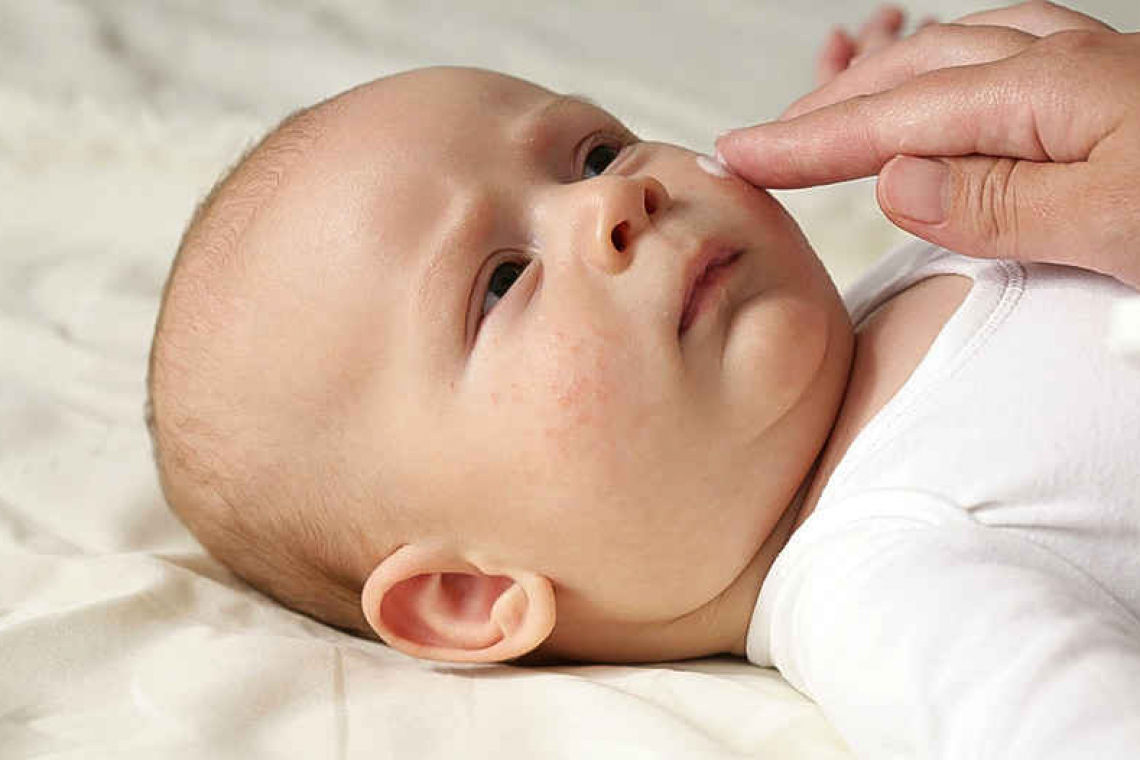Authors: Zinab Alsadek, Colin Michie
You scheduled a family portrait photograph with your newborn son, but you keep postponing the appointment. He is 5 months old now and looks even worse, with dark, dry rashes on his cheeks. And you have carefully breastfed him, despite that early mastitis! He scratches or rubs his face on the sheets much of the night; loss of sleep is challenging everyone. His skin comes out first with very small bumps and when he scratches, it looks like your partner’s eczema. This pesky rash is hot and scaly: it has spread around the back of the baby’s neck, elbows and wrists. It is driving everyone crazy!
Eczema is more frequent in children, usually starting before a year of age. It is less common but often more severe in Afro-Caribbean children. Although its causes are unknown it runs in some families. Eczema distresses itchy infants. Exhausted, despairing parents often feel guilty for causing it too! Parents find advice, remedies and prescriptions vary greatly. For your baby, your mission will be to find out what works best. This will be a challenge because we all have different skin. The good news is that with time, most infant eczema resolves.
Infant eczema develops following damage to the skin’s barriers. At a microscopic level, dense mats of proteins bind skin cells together like a carpet. This carpet is covered in protective lipids that keep water in and foreign molecules out. This proofing combination includes ceramides and cholesterol, making the whole carpet a little acidic. The most common inherited forms of eczema damage the functions of a protein, filaggrin, a critical knot that seals this carpet.
And that point is crucial – skin barriers work both ways. Perhaps a soap on the outside makes eczema worse, but, equally, it might be something in your infant’s diet – a food allergy – that brings it on. Whatever gets through leaky barriers can cause allergic reactions, with inflammation and histamine release. Crowds of allergy cells live in the skin, bowel, eyes, nose and lungs. So infant eczema may be part of allergies causing itchy eyes or wheezing. Does a particular food make your infant’s eczema worse – perhaps it is something unusual, such as tomatoes? Skin prick tests in infants are not as useful as in adults – elimination diets take time and patience. Other environmental factors such as vaccines or pets are less likely to cause infant eczema.
Skin barriers need constant checking. When they are broken, bacteria on the surface of the skin become more invasive. Eczema or allergic dermatitis is made worse by infection at the skin surface and scratching is often the cause of this. Infection causes the skin to thicken and causes changes to skin pigmentation.
Learn what triggers your infant’s itch!
An important key to managing your baby’s eczema is to reduce scratching. Easier said than done! Some little guys will itch out of habit, some do it in their sleep. And we all know that relief from a good scratch! So once their skin is moisturised to prevent it drying out, trim those infant nails and use mittens or socks on their hands to limit damage. Find out what makes your infant’s skin flare. For instance, temperature extremes can make the skin itchier. Using cool water for bathing and avoiding warm bedding will ease scratching. Soft cotton clothing might help. Bathing is important to infant skin health, but be cautious – it can disturb those protective lipids and the skin barriers for several hours. Soaps, cleansers, disinfectants, fibres and oils can trigger eczema in some babies. Other stresses can irritate infant skin too, including poor air quality in the infant’s bedroom from cigarette smoke, recent painting or insecticides.
A lack of pharmaceutical trials is a problem for infant eczema; for instance, most do not include many Afro-Caribbean infants. Not all treatments work for all children. This means that adverts will tempt parents with treatments with no basis on strong evidence. Recently published trials in adults show the benefits of several new anti-inflammatory agents; so far these are not available for infants – perhaps this is to come. Treatment plans for infants can be complex. They might include thick emollients, ointments or coconut oil, applied after bathing. Wet dressings or wraps help soothe and hydrate the skin. Prescriptions may include oral antihistamines to stop itching, or topical antibiotics or steroids to target infection and allergy. To make progress with your infant’s eczema, you need great patience backed by the care, support and advice from your local community.
Parents must always be proud to show off their new-born, skin rashes and all. With allergen avoidance, regular treatments and support from others, some smooth skin should be possible.
Useful Resources:
National Eczema Association: https://nationaleczema.org/eczema/children/
American Academy of Dermatology: https://www.aad.org/public/diseases/eczema/childhood
Air Quality and Eczema: https://www.indoordoctor.com/the-link-between-indoor-air-quality-and-eczema/







